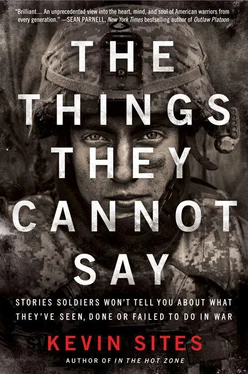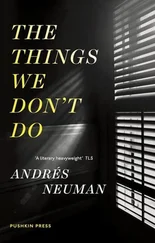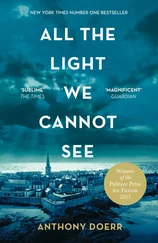While he refused to think about his own war, Saal became increasingly agitated by the new wars he was reading about and watching on TV, in Afghanistan and Iraq. He says his nervous breakdown began in the summer of 2005 when a large number of Marines from a reserve unit in Ohio were killed during fighting in Iraq. He became further enraged when Marines in Haditha were accused of war crimes and called criminals due to allegations that they had killed civilians in response to an ambush on the unit that left five Marines dead.
“It’s Bush and Cheney that were criminals,” says Saal, “not these Marines.”
By May of 2006, Saal could no longer keep his war hidden in a cloud of pot smoke. He had been feeling more unsteady over the last four years, and America’s newest wars ramped up the mix of anger, sadness, emptiness and denial. It overtook him and he voluntarily admitted himself into the psychiatric ward of Akron’s Saint Thomas Hospital. On the advice of the hospital’s doctors, he retired from teaching and went through the hospital’s six-month post-traumatic stress disorder program. It would be his first step in pursuit of the soul he says he lost thirty-six years prior in Vietnam.
“I got in the psych ward and cried for two weeks,” says Saal. “I hadn’t cried for forty years. But the luckiest thing that happened to me was to have that breakdown. It gave me an opportunity to quit [pot and alcohol]. If that hadn’t happened you wouldn’t be talking to me now. It was just a matter of turning my steering wheel.”
After quitting his addictions and establishing a clear head for the first time in decades, Saal began coming to terms with the war that almost killed him and that he believed had certainly taken his soul.
But his life-changing decisions came with their own consequences. When Saal’s post-traumatic stress lid came off, so did the problems in his marriage. Years of neglect couldn’t be repaired with apologies. His and his wife separated in 2007.
“I did what addicts do,” Saal says. “I ignored her and the girls.”
But despite that loss, he still feels his life is getting better, having reckoned with the past.
“I don’t want to die anymore and I don’t want to go back to the sad angry person I was. When our president chose to send thirty thousand men back to Afghanistan after he said he was going to end it, I didn’t let it drive me crazy. I still have nightmares, but they don’t bother me as much now that I’m not drinking tequila and smoking pot.”
He no longer teaches high school English but now fills his days working at Freedom House, a homeless shelter for war veterans. He also volunteers at the detox and psychiatric wards of Saint Thomas Hospital. He said while some veterans like him finally do break down and ask for help, so many others don’t and continue a downward spiral of drug and alcohol abuse as a form of self-medication.
“For every one who comes in, ten don’t. For every ten who come in, eight relapse. The mind starts yapping to you, ‘Sobriety isn’t very fun, I’m going back down to the bar.’ I talk to people every day that relapse.”
Saal has been clean six years in May 2012, exactly forty-two years after he was discharged from the Marines.
“You don’t come home from war the same way you went,” he says. “I’m doing a lot of writing now. I could never write poetry myself until the last three months. Now it comes out like crazy. I’m getting to do this stuff today all because I quit drinking and drugging and turned my life around. I sponsor recovering addicts, giving back. I want to do this work until I die. It works if you live it. I don’t wake up wanting to get high. It’s primarily because I try to live the program. What else the fuck can I ask for? I still teach, but now I teach veterans and others and, in turn, I continue to teach myself the process of recovery from the effects of trauma.”
Thomas Saal’s is the kind of bittersweet success story that is common for combat veterans willing to confront the demons of their past. Dr. Jonathan Shay wrote in Achilles in Vietnam , “If recovery means return to trusting innocence, recovery is not possible. Recovered survivors of severe trauma adapt their own lives, including their limitations, with passion and existential authority. These veterans can become profoundly valuable human beings, even if their accomplishments in the world are often limited.”
Saal also belongs to a support group called Warriors’ Journey Home, founded by psychologist Edward Tick, author of War and the Soul: Healing Our Nation’s Veterans from Post-Traumatic Stress Disorder . Part of Tick’s practice involves bringing Vietnam veterans back to Vietnam to confront the war they left physically so long ago but that has never left their psyche.
In October of 2010, Thomas Saal went back to Vietnam on a trip with Dr. Tick and visited the site of his most traumatic experience: the place where his men crucified the NVA officer. He sent me this e-mail response to my question of whether he was able to find his soul:
The trip was absolutely wonderful and yes, I did find my soul right where I left it 42 years ago… I was also able to read my poetry with North Vietnamese and Vietcong soldiers… In addition, I handed out over 50 Beenie Babies to children of the school which my officer class built 10 years ago… My picture was plastered all over the front page of Vietnamese newspapers while I was passing out the dolls to the kids and also for writing a poem from the point of view of a Vietnamese child suffering from the effects of Agent Orange… In addition, I attended an AA meeting in freakin’ Hanoi while the city was celebrating it’s one-thousandth anniversary… What a trip that was!
Upon his return from Vietnam, Saal wrote the following poem, which he considers the culmination of the recovery work with which he’s been involved. This is an excerpt.
As the soft breeze of the East Sea blows over this land of peaceful people,
as the sun shines down on this land of plenty,
as the moon rises up to lighten the night time shadows,
as our group of pilgrims prepares to leave for home
following a new and wonderful journey of rebirth,
I can only be ever so grateful to those who helped me on this path of healing,
this holy and spiritual path which has returned my soul to me.
There was a time when I felt as if the world had deserted me,
that I had no one on which to lean.
Darkness had enveloped me, surrounded me,
sucking the life from my veins as does a sponge soak water.
There was a time when I thought my heart would never be at peace,
when nights were sleepless and days were dark,
when death’s graveyards were constantly in my thoughts,
when dying children, wives without husbands,
when spirit-lacking, disillusioned soldiers wandered the tunnels of my dreams.
But today, I feel this way no longer.
The past is now the past—done, finished,
a part of my life which has been put away
as one does a completed novel.
Today, I can once again breathe the cool, refreshing air of springtime.
Today, I can reflect on my life and accept myself
as one who has made mistakes and rectified them.
Today, I have found peace of mind.
Today, the grave is open and my soul and I are reunited.
Tom Saal, November 2010
Postscript
Today, Saal continues to work at Freedom House in Kent, Ohio, as a case manager for homeless veterans. He is still heavily involved with Warriors’ Journey Home and still frequents the psychiatric and detox wards of Saint Thomas Hospital in Akron. He says he no longer goes to bed sad, angry, miserable and depressed and that he certainly doesn’t wake up that way. Today, he smiles, laughs and even cries, things he never did in years past. He says he’s even happy once in a while, as he believes happiness is like a butterfly, something he heard from a counselor and friend years ago. It comes and lands on one’s shoulder from time to time and then flits away. However, today Saal is okay with himself, and that is something he could never have said during that first thirty-five years after his return from Vietnam.
Читать дальше












